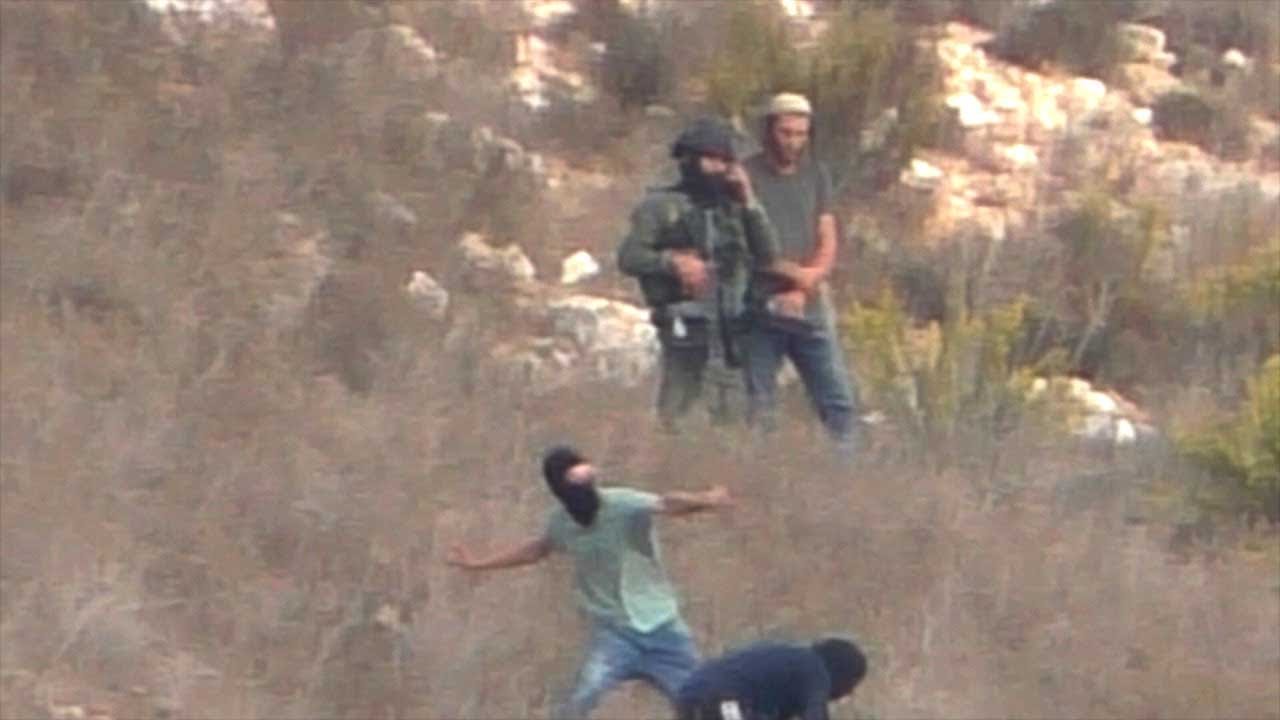Throughout the last olive harvest in the West Bank, which took place from September to November 2022, B’Tselem documented 48 incidents of settler violence against Palestinians and their property, sometimes with soldiers participating and always with full state support. Many farmers were left without an expected income they worked for over the year, and some also without oil and olives for their yearly domestic use.
In 13 incidents, settlers attacked harvesters with stones, clubs, iron pipes and pepper spray, injuring 11. Six of the victims required hospital care and the others were treated on-site. In 18 cases, settlers harassed or threatened farmers. In 40 incidents, settlers damaged trees and agricultural equipment; in eight of these, the settlers also drove the harvesters away before beginning the vandalism. In 18 cases, settlers stole olives they picked or Palestinians had picked earlier. Fifteen of the incidents occurred in groves the military bars the Palestinian owners from accessing without permission. In total, settlers destroyed more than 800 olive trees, both young and mature, burning 45 of them. Settlers also vandalized 13 cars belonging to harvesters or activists that were parked by the groves, torching three.
Over the course of the harvest, B’Tselem documented 14 incidents in which soldiers were present. In five, the soldiers joined in settlers’ attacks, firing tear gas canisters or hurling stun grenades at the harvesters or at other Palestinians who came to their aid. In four of the incidents, soldiers also fired live rounds in the air. In one of the cases, a Palestinian who was called to help farmers under attack by settlers was injured in both legs by a soldier who fired two rubber-coated metal bullets at him. In another case, no settlers were present at all and soldiers tried to prevent harvesters from reaching their land, meeting their insistence by firing tear gas canisters at them and forcing them to leave. Soldiers intervened to remove settlers in two cases only; in a third, they returned olives settlers had stolen to the Palestinian owners.
These attacks are part of an annual ritual that takes place during the olive harvest, in broad daylight and with state support. The Israeli authorities and the Palestinian farmers know it will recur, yet Israel consistently refrains from preventing these predictable acts of violence and even helps them along. The military’s claim it prepares in advance to prevent them is merely a pretense, designed to deflect criticism while enabling the violence to continue. For example, the military set up “coordination mechanisms” to ostensibly protect the harvesters. Aside from the fact that the proper course of action would have been to stop the settlers from entering the land rather than restrict the Palestinian owners, this system is a failure: The military gives the farmers only a few days, which is not enough time to pick all the olives; soldiers do not always show up on the “coordinated” days; and even when they do – they often allow settlers to attack the farmers and sometimes even join in.
Military-backed settler violence is not unique to the olive harvest season, but a permanent reality for Palestinians in the West Bank. It is one of the methods the state uses to to gain control of more land in the West bank. Deterring Palestinians from entering and cultivating their own land makes it easier for the state to it take over and use it for its own purposes.
A YouTube link was detected in your post. Here are links to the same video on Invidious, which is a YouTube frontend that protects your privacy:



